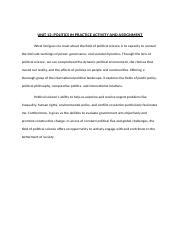Political science is the systematic study of politics and the exercise of power in society. It examines how governments and other political institutions operate, how power is distributed and used, and how political decisions are made. Political science provides insights into the complexities of human behavior and the reasons why societies are organized the way they are.

Key Concepts in Political Science
Politics: The process by which individuals and groups interact to make decisions that affect their collective well-being.
Power: The ability to influence the behavior of others, either through coercion or persuasion.
Governance: The exercise of political authority to manage a society and provide for its citizens.
Government: A formal organization that has the authority to make and enforce laws.
State: A political community with a defined territory, population, and government.
Nation: A group of people who share a common culture, language, and history.
Subfields of Political Science
Political science is a vast and interdisciplinary field that encompasses a wide range of subfields, including:
- Comparative politics: Compares political systems and institutions across different countries.
- International relations: Studies the interactions between nations and the dynamics of the global political system.
- Political theory: Explores the fundamental principles and concepts that underlie political systems.
- Public policy: Analyzes the development and implementation of government policies.
- Political economy: Investigates the relationship between politics and economics.
- Political behavior: Studies the behavior of voters, interest groups, and other political actors.
Importance of Political Science
Political science is essential for understanding the world around us. It provides the tools to analyze political issues, participate in political decision-making, and make informed choices about our future. By studying political science, we can:
- Understand how governments work: Political science helps us comprehend the structures, processes, and functions of different types of governments.
- Identify and analyze political problems: Political scientists use research and analysis to identify and explain the causes and consequences of political problems.
- Develop solutions to political challenges: Political science provides insights into potential solutions to political problems, helping policymakers and citizens make informed decisions.
- Participate effectively in the political process: Understanding political science allows us to engage with the political system, understand our rights and responsibilities, and make our voices heard.
Statistics and Trends
- According to the American Political Science Association (APSA), there are over 15,000 political scientists in the United States.
- The median salary for political scientists is $107,180 per year (Bureau of Labor Statistics, 2021).
- Political science is a popular major for undergraduate students, with over 200,000 degrees awarded in the United States annually (National Center for Education Statistics, 2020).
- The number of women and minorities in political science has increased significantly in recent years (APSA, 2022).
Career Opportunities
A degree in political science opens doors to a wide range of career opportunities in:
- Government: Policy analysis, public administration, government relations
- Nonprofit sector: Public interest organizations, advocacy groups, community development
- Business: Consulting, corporate strategy, public affairs
- Research: Academia, think tanks, research institutions
- Journalism: Political reporting, commentary, and analysis
Tips for Studying Political Science
- Develop critical thinking skills: Political science requires the ability to analyze information, identify biases, and construct sound arguments.
- Take diverse courses: Explore different subfields of political science to gain a broad understanding of the discipline.
- Participate in research: Hands-on research experience can deepen your knowledge and enhance your skills.
- Engage in extracurricular activities: Join political clubs, attend lectures, and participate in internships to supplement your coursework.
- Stay informed: Keep up with current events and political debates to apply your knowledge to real-world situations.
Conclusion
Political science is a dynamic and engaging field that offers insights into the nature of power, governance, and human society. By studying political science, we can better understand the world around us, participate effectively in the political process, and make informed choices about the future.
